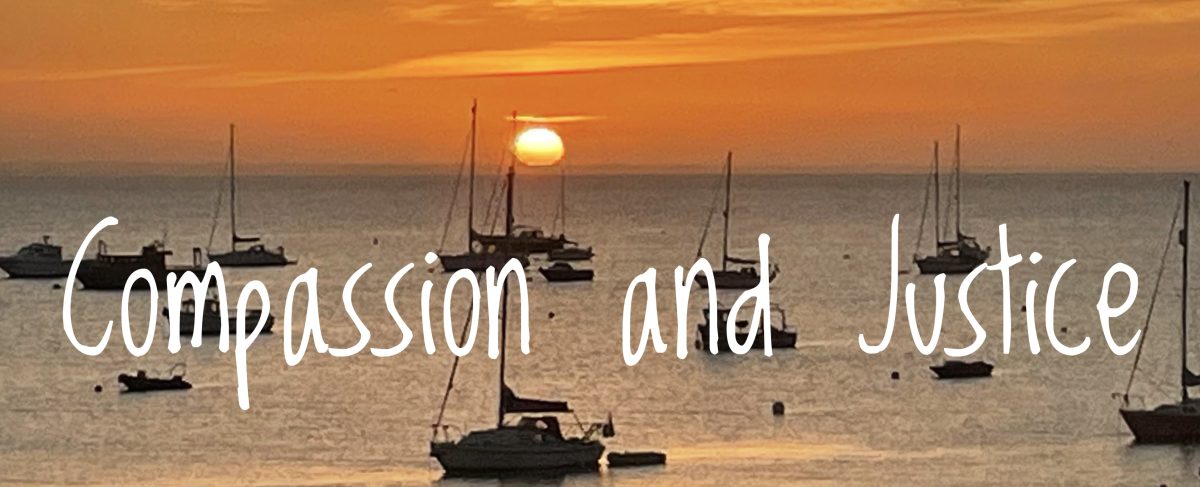 Jesus affirmed the Old Testament law: “You shall love your neighbour as yourself” (Italics mine). The implication here is clear: how we love and treat other people, is linked very closely to how we love and treat ourselves. I must admit that I have often emphasised the first part – loving our neighbour – and ignored the second part – loving ourselves. If we don’t love ourselves we do not have much basis for loving other people. We may feel uncomfortable about the idea of loving ourself. Connotations include selfishness, and “looking after number one”. But there is a place for loving, and caring for, ourself so that we are free to love other people. In this article I want to explore this in more detail.
Jesus affirmed the Old Testament law: “You shall love your neighbour as yourself” (Italics mine). The implication here is clear: how we love and treat other people, is linked very closely to how we love and treat ourselves. I must admit that I have often emphasised the first part – loving our neighbour – and ignored the second part – loving ourselves. If we don’t love ourselves we do not have much basis for loving other people. We may feel uncomfortable about the idea of loving ourself. Connotations include selfishness, and “looking after number one”. But there is a place for loving, and caring for, ourself so that we are free to love other people. In this article I want to explore this in more detail.
Love your neighbour as yourself in the Bible
The first reference to loving our neighbour as ourself in found in the Old Testament law. It is then restated 4 times in the Gospels, and 3 times in the New Testament letters.
You shall not seek revenge, or bear a grudge against one of your people, but love your neighbour as yourself: I am the Lord. (Leviticus 19:18 NIV)
‘Honour your father and mother,’ and, ‘love your neighbour as yourself.'” (Matthew 19:19 NIV)
Jesus said to him, “You shall love the LORD your God with all your heart, with all your soul, and with all your mind.” This is the first and great commandment. And the second is like it: “You shall love your neighbour as yourself.” (Matthew 22:37–39 NKJV)
“And you shall love the Lord your God with all your heart, with all your soul, with all your mind, and with all your strength.” This is the first commandment. And the second, like it, is this: “You shall love your neighbour as yourself.” There is no other commandment greater than these. (Mark 12:30–31 NKJV)
He answered: “‘Love the Lord your God with all your heart and with all your soul and with all your strength and with all your mind,’ and ‘Love your neighbour as yourself.'” (Luke 10:27 NIV)
For the commandments, “You shall not commit adultery,” “You shall not murder,” “You shall not steal,” “You shall not bear false witness,” “You shall not covet,” and if there is any other commandment, are all summed up in this saying, namely, “You shall love your neighbour as yourself.” (Romans 13:9 NKJV)
The entire law is summed up in a single command: “Love your neighbour as yourself.” (Galatians 5:14 NIV)
If you really keep the royal law found in Scripture, “Love your neighbour as yourself,” you are doing right. (James 2:8 NIV)
Agape – unconditional love
There are several greek words translated as ‘love’ but in all the New Testament quotations the word used is “agape” or unconditional love. This is the word used to express God’s love for us. His love for us is in spite of our imperfections, does not depend on whether we acknowledge him or not, whether we submerse ourselves in His love or rebel against it.
God’s love is not sentimental. It is not a feeling. It is God actively seeking to reconcile humanity to himself.
The same word is used also to describe our love for others – and for ourselves! This is the kind of love we can have as a response to Him and to the people who He loves, and towards ourselves as well.
Made in God’s image
It is God’s nature to love. The Bible says that we are made in His image and He has placed within us the ability to love unconditionally. Because we have free wills we also have the capacity to disregard, or ‘run roughshod over’, other people.
Love for ourself
 The assumption in these verses is that we love who we are, and we can love other people in the same way. Unfortunately we do not always love who we, are and can understate, minimise or totally think of ourselves as undeserving of love.
The assumption in these verses is that we love who we are, and we can love other people in the same way. Unfortunately we do not always love who we, are and can understate, minimise or totally think of ourselves as undeserving of love.
- Loving ourself is not selfishness unless we do not care about anyone else.
- Loving ourself is recognising our own worth in the eyes of those who love us.
- Loving ourself is looking after our own health, by eating the right things and maintaining the right weight.
- Loving ourself is not abusing our bodies with tobacco, excessive alcohol or drugs. (Not because of religious rules, but simply because those things are bad for us.)
- Loving ourself is looking after our own mental, emotional and spiritual nature.
- Loving ourself is being happy with the way we are.
- Loving ourself is so much easier when we accept the love of others who love us “just the way we are”.
- Loving ourself is so much easier when we accept that God loves us, in spite of our imperfections.
What stops us from loving ourself
There are many things which prevent us truly loving ourselves and so rob us (and others) of the benefits of love and loving.
- We can listen to, and ‘take on board’, the negative things which our parents, our friends and other people say about us.
- We can believe the things which traditional religion says about us. We are not “utterly depraved” and not “a worm”. We are beings made in the image of God, with free wills, capable of amazing love but also capable of astonishing evil.
- We can feel worthless.
- Having bitterness, resentment and being unforgiving towards other people.
- Guilt is the main reason for self-loathing. But we have a God who freely forgives us, “For we know not what we do”. All we have to do is accept that forgiveness to be free from guilt, and all its effects.
Conclusion

I have, in the past, put undue pressure on people to love others when the problem is that they do not have love for themselves. The way we treat ourselves is the key to loving other people. Be free from guilt, and feeling worthless. Know that you have a God who loves you unconditionally. Accept his love and forgiveness. Look after yourself and say “It is well with my soul”.
Then you will find that you have an amazing capacity to love other people. Love your family, love your friends, love the refugee and the asylum seeker, love the person dependent on state benefits, love the child living in another country dying from a preventable decease, love the homeless, the hungry, the prisoner, the slave.
This love is not a just a warm feeling, a sympathy, a pity. This love is practical. It means sharing our resources (money, time etc.). It means standing up against corruption and injustice. It means having open hearts towards those who suffer and are in need.
Then:
If you spend yourselves in behalf of the hungry
and satisfy the needs of the oppressed,
then your light will rise in the darkness,
and your night will become like the noonday.The Lord will guide you always;
he will satisfy your needs in a sun-scorched land
and will strengthen your frame.
You will be like a well-watered garden,
like a spring whose waters never fail.
(Isaiah 58:10-11 NIV)

One thought on “Loving ourselves before loving humanity”
Comments are closed.